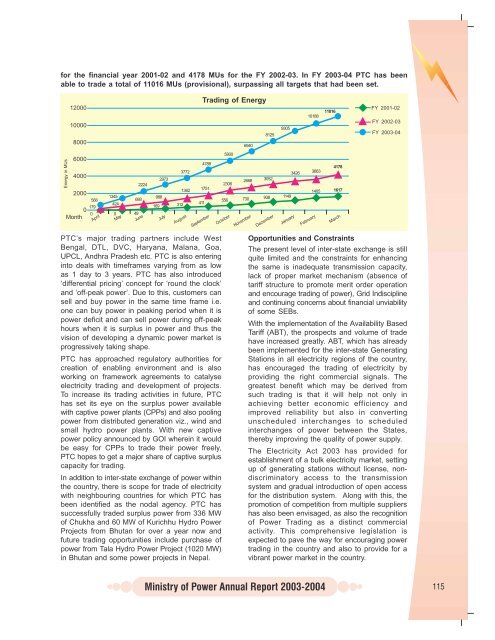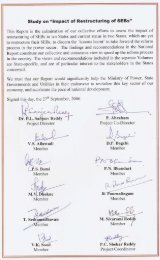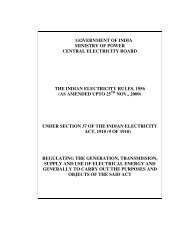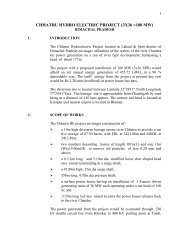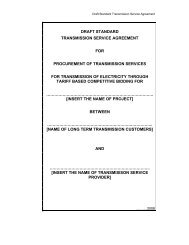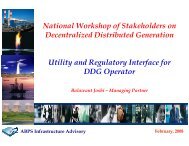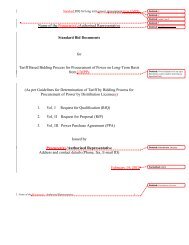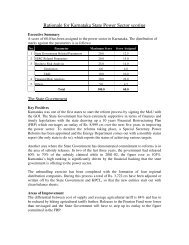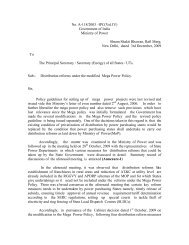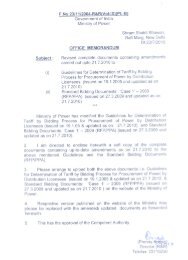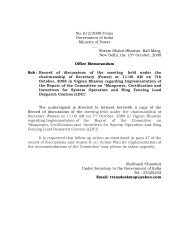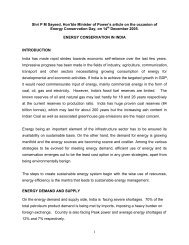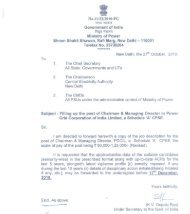Untitled - Ministry of Power
Untitled - Ministry of Power
Untitled - Ministry of Power
You also want an ePaper? Increase the reach of your titles
YUMPU automatically turns print PDFs into web optimized ePapers that Google loves.
for the financial year 2001-02 and 4178 MUs for the FY 2002-03. In FY 2003-04 PTC has been<br />
able to trade a total <strong>of</strong> 11016 MUs (provisional), surpassing all targets that had been set.<br />
Energy in MUs<br />
12000<br />
10000<br />
8000<br />
6000<br />
4000<br />
2000<br />
568<br />
179<br />
0<br />
0<br />
Month<br />
April<br />
1345<br />
424<br />
0<br />
May<br />
2224<br />
688<br />
49<br />
June<br />
2973<br />
July<br />
3772<br />
1362<br />
Trading <strong>of</strong> Energy<br />
4788<br />
1751<br />
PTC’s major trading partners include West<br />
Bengal, DTL, DVC, Haryana, Malana, Goa,<br />
UPCL, Andhra Pradesh etc. PTC is also entering<br />
into deals with timeframes varying from as low<br />
as 1 day to 3 years. PTC has also introduced<br />
‘differential pricing’ concept for ‘round the clock’<br />
and ‘<strong>of</strong>f-peak power’. Due to this, customers can<br />
sell and buy power in the same time frame i.e.<br />
one can buy power in peaking period when it is<br />
power deficit and can sell power during <strong>of</strong>f-peak<br />
hours when it is surplus in power and thus the<br />
vision <strong>of</strong> developing a dynamic power market is<br />
progressively taking shape.<br />
PTC has approached regulatory authorities for<br />
creation <strong>of</strong> enabling environment and is also<br />
working on framework agreements to catalyse<br />
electricity trading and development <strong>of</strong> projects.<br />
To increase its trading activities in future, PTC<br />
has set its eye on the surplus power available<br />
with captive power plants (CPPs) and also pooling<br />
power from distributed generation viz., wind and<br />
small hydro power plants. With new captive<br />
power policy announced by GOI wherein it would<br />
be easy for CPPs to trade their power freely,<br />
PTC hopes to get a major share <strong>of</strong> captive surplus<br />
capacity for trading.<br />
In addition to inter-state exchange <strong>of</strong> power within<br />
the country, there is scope for trade <strong>of</strong> electricity<br />
with neighbouring countries for which PTC has<br />
been identified as the nodal agency. PTC has<br />
successfully traded surplus power from 336 MW<br />
<strong>of</strong> Chukha and 60 MW <strong>of</strong> Kurichhu Hydro <strong>Power</strong><br />
Projects from Bhutan for over a year now and<br />
future trading opportunities include purchase <strong>of</strong><br />
power from Tala Hydro <strong>Power</strong> Project (1020 MW)<br />
in Bhutan and some power projects in Nepal.<br />
988<br />
169<br />
312<br />
411<br />
5800<br />
2306<br />
556<br />
6940<br />
2668<br />
730<br />
8125<br />
3052<br />
938<br />
August<br />
September<br />
October<br />
November<br />
December<br />
9305<br />
1149<br />
3426<br />
10188<br />
3663<br />
1405<br />
January<br />
February<br />
11016<br />
4178<br />
1617<br />
March<br />
FY 2001-02<br />
FY 2002-03<br />
FY 2003-04<br />
Opportunities and Constraints<br />
The present level <strong>of</strong> inter-state exchange is still<br />
quite limited and the constraints for enhancing<br />
the same is inadequate transmission capacity,<br />
lack <strong>of</strong> proper market mechanism (absence <strong>of</strong><br />
tariff structure to promote merit order operation<br />
and encourage trading <strong>of</strong> power), Grid Indiscipline<br />
and continuing concerns about financial unviability<br />
<strong>of</strong> some SEBs.<br />
With the implementation <strong>of</strong> the Availability Based<br />
Tariff (ABT), the prospects and volume <strong>of</strong> trade<br />
have increased greatly. ABT, which has already<br />
been implemented for the inter-state Generating<br />
Stations in all electricity regions <strong>of</strong> the country,<br />
has encouraged the trading <strong>of</strong> electricity by<br />
providing the right commercial signals. The<br />
greatest benefit which may be derived from<br />
such trading is that it will help not only in<br />
achieving better economic efficiency and<br />
improved reliability but also in converting<br />
unscheduled interchanges to scheduled<br />
interchanges <strong>of</strong> power between the States,<br />
thereby improving the quality <strong>of</strong> power supply.<br />
The Electricity Act 2003 has provided for<br />
establishment <strong>of</strong> a bulk electricity market, setting<br />
up <strong>of</strong> generating stations without license, nondiscriminatory<br />
access to the transmission<br />
system and gradual introduction <strong>of</strong> open access<br />
for the distribution system. Along with this, the<br />
promotion <strong>of</strong> competition from multiple suppliers<br />
has also been envisaged, as also the recognition<br />
<strong>of</strong> <strong>Power</strong> Trading as a distinct commercial<br />
activity. This comprehensive legislation is<br />
expected to pave the way for encouraging power<br />
trading in the country and also to provide for a<br />
vibrant power market in the country.<br />
115


